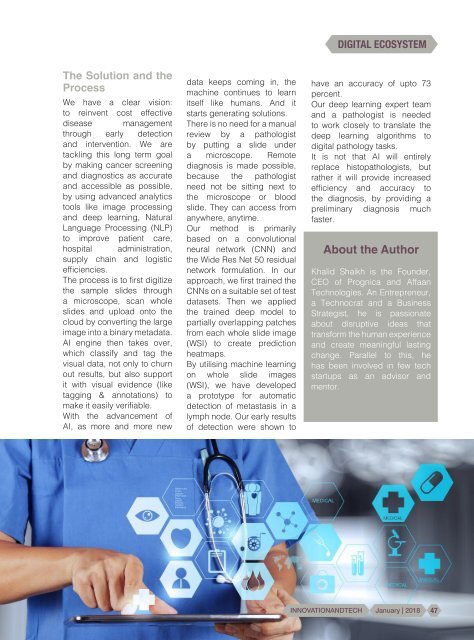Innovation i tech High
You also want an ePaper? Increase the reach of your titles
YUMPU automatically turns print PDFs into web optimized ePapers that Google loves.
DIGITAL ECOSYSTEM<br />
The Solution and the<br />
Process<br />
We have a clear vision:<br />
to reinvent cost effective<br />
disease management<br />
through early detection<br />
and intervention. We are<br />
tackling this long term goal<br />
by making cancer screening<br />
and diagnostics as accurate<br />
and accessible as possible,<br />
by using advanced analytics<br />
tools like image processing<br />
and deep learning, Natural<br />
Language Processing (NLP)<br />
to improve patient care,<br />
hospital administration,<br />
supply chain and logistic<br />
efficiencies.<br />
The process is to first digitize<br />
the sample slides through<br />
a microscope, scan whole<br />
slides and upload onto the<br />
cloud by converting the large<br />
image into a binary metadata.<br />
AI engine then takes over,<br />
which classify and tag the<br />
visual data, not only to churn<br />
out results, but also support<br />
it with visual evidence (like<br />
tagging & annotations) to<br />
make it easily verifiable.<br />
With the advancement of<br />
AI, as more and more new<br />
data keeps coming in, the<br />
machine continues to learn<br />
itself like humans. And it<br />
starts generating solutions.<br />
There is no need for a manual<br />
review by a pathologist<br />
by putting a slide under<br />
a microscope. Remote<br />
diagnosis is made possible,<br />
because the pathologist<br />
need not be sitting next to<br />
the microscope or blood<br />
slide. They can access from<br />
anywhere, anytime.<br />
Our method is primarily<br />
based on a convolutional<br />
neural network (CNN) and<br />
the Wide Res Net 50 residual<br />
network formulation. In our<br />
approach, we first trained the<br />
CNNs on a suitable set of test<br />
datasets. Then we applied<br />
the trained deep model to<br />
partially overlapping patches<br />
from each whole slide image<br />
(WSI) to create prediction<br />
heatmaps.<br />
By utilising machine learning<br />
on whole slide images<br />
(WSI), we have developed<br />
a prototype for automatic<br />
detection of metastasis in a<br />
lymph node. Our early results<br />
of detection were shown to<br />
have an accuracy of upto 73<br />
percent.<br />
Our deep learning expert team<br />
and a pathologist is needed<br />
to work closely to translate the<br />
deep learning algorithms to<br />
digital pathology tasks.<br />
It is not that AI will entirely<br />
replace histopathologists, but<br />
rather it will provide increased<br />
efficiency and accuracy to<br />
the diagnosis, by providing a<br />
preliminary diagnosis much<br />
faster.<br />
About the Author<br />
Khalid Shaikh is the Founder,<br />
CEO of Prognica and Affaan<br />
Technologies. An Entrepreneur,<br />
a Technocrat and a Business<br />
Strategist, he is passionate<br />
about disruptive ideas that<br />
transform the human experience<br />
and create meaningful lasting<br />
change. Parallel to this, he<br />
has been involved in few <strong>tech</strong><br />
startups as an advisor and<br />
mentor.<br />
50 www.innovationand<strong>tech</strong>.ae<br />
INNOVATIONANDTECH<br />
January | 2018<br />
47






